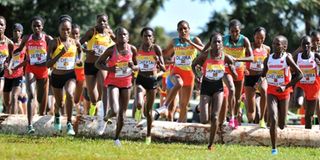Poor preparation for IAAF event is embarrassing

Female athletes from different counties race during the IAAF World Cross Country championship at Kololo Independence Ground in Kam pala on March 25. Photo by Ismail Kezala
What you need to know:
The issue: IAAF World Cross-Country Championship.
Our view: The respective ministries cannot just wish and hope such events will somehow be a success. They must work at it. They must look at how other countries prepare for such events and take notes.
Ugandan long-distance runner Jacob Kiplimo did the country proud on Sunday afternoon at the 42nd IAAF World Cross-Country Championship. He won Uganda’s first gold in the Junior Men’s 8km race. Many people’s bets and hopes were on Joshua Cheptegei. Unfortunately, Cheptegei let the fans down when he didn’t win. This is why Kiplimo’s win is treasured. It was both a surprise and a consolation for the country, whose first time it was to host the event.
The sad thing about this event is that many Ugandans were not aware that we were hosting it at Kololo Independence Grounds. The event saw more than 50 national teams attend. About 500 athletes from all over the world flew into the country to participate, including favourite and elite runners from Ethiopia and Kenya.
Many hotels within the capital city hosted these teams no doubt raking in some good profits. This is why it is embarrassing that a global event of this magnitude was held in our country and hardly any publicity was done by the government.
According to David Ntege, the head of promotions at the local organising committee, the funds meant for marketing the event came in late and were limited.
He said: “The money supposed to facilitate the marketing process should have come in about two years ago but only arrived in February,” (See Saturday Monitor of March 25 IAAF: Event awareness affected by limited, delayed funding).
Also, with only two days to the day, Uganda Broadcasting Corporation, the TV station that was meant to capture footage to supply to IAAF, had not yet received the money to get the airing rights. Such disorganisation and bureaucracy explains the dismal publicity of such a great event. Looking at much smaller events, one can see better preparations and work done. The (Airtel) Kabaka Birthday Run has received much better publicity and yet it is a city run at best. The annual MTN marathon attracts mostly only Ugandan athletes and few other nationals, but months before the event is held, almost all Ugandans are made aware through adverts on all forms of media. Surely more should have been done for a global event.
The respective ministries cannot just wish and hope such events will somehow be a success. They must work at it. They must look at how other countries prepare for such events and take notes. They must look at successful local events held at home and look for possibilities of partnerships with the organisers. Stop embarrassing us, give us something to be proud of.




